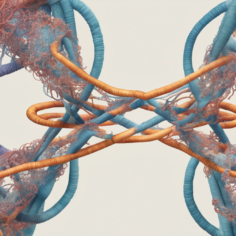
Allergies may seem commonplace, but beneath the surface, there’s a riveting world of science that sheds light on their causes and possible treatments. In this article, we’re unravelling the fascinating science behind allergies, diving deep into the causes, effects, and cutting-edge remedies to help you navigate and manage this widespread health concern.
What Are Allergies?
Allergies are our immune system’s exaggerated response to substances that, generally, aren’t harmful. These substances, known as allergens, can range from dust and pollen to certain foods.
The Immune Response in Allergies
So, what happens when the body encounters an allergen? It involves a complex interaction of cells and chemicals within the immune system. Your body sees the allergen as an invader and produces antibodies called Immunoglobulin E (IgE). These IgEs cause certain cells to release chemicals, including histamine, culminating in allergy symptoms.
(Read Also: Tailor-made Healthcare: Unlocking the Potential of Personalized Medicine)
Causes of Allergies
Allergies can be inherited, often run in families, and exposure to allergens at particular times when the immune system is developing can also impact their onset.
Common Allergies and Their Symptoms
Allergies come in various forms, such as food allergies, insect allergies, pet allergies, and more. Symptoms may include sneezing, itchiness, hives, and in severe cases, anaphylaxis—a life-threatening condition that requires immediate attention and can cause breathing difficulty and a sudden drop in blood pressure.
The Controversy: Are We Too Clean?
The ‘Hygiene Hypothesis,’ proposes that living in cleaner, germ-free environments may contribute to an increased risk of allergies. The idea is that our immune systems need to come in contact with germs for healthy development. However, it’s still a topic of considerable debate within the scientific community, with some scholars advocating for a more nuanced view.
(Read Also: Revolutionary Advancements in Cancer Treatment: The Dawn of a New Horizon)
Treatments for Allergies
Medical science has made significant strides in the management and treatment of allergies. Here are some common treatments:
- Over-the-counter Drugs: Antihistamines and decongestants are standard medications to manage mild allergy symptoms.
- Prescription Drugs: For severe allergies, doctors may prescribe Corticosteroids or other powerful medicines.
- Immunotherapy: A long-term remedy involving regular injections of a small amount of allergens to build tolerance over time.
- Emerging Treatments: There’s ongoing research about the use of probiotics, biological drugs, and gene therapy as potential treatments for allergies. But, it’s still in the realm of ‘potential’ and ‘promising.’
This article is a window into the complex world of allergies and is meant to inspire a deeper understanding of the subject. It’s essential to consult health professionals for advice customized to individual cases. Awareness combined with professional guidance can often make a difference in managing allergies effectively.
Last modified: 12 December 2023


















